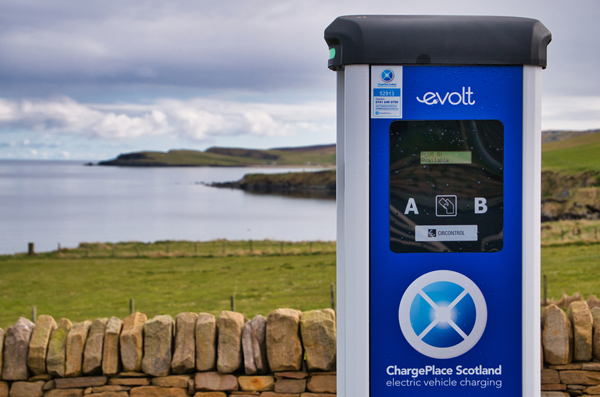The Scottish Government is allocating over £7m in the first tranche of its £30m Electric Vehicle Infrastructure Fund - set up to encourage private investment in the electric vehicle (EV) charging network.
Almost £6.9m has been awarded to a partnership comprising Aberdeen City Council, Aberdeenshire Council, The Highland Council and Moray Council, and a further £300,000 has been awarded to Dundee City Council.
Transport Scotland said the lower funding figure for Dundee reflects the fact that the city already benefits from a comprehensive network of public charging – as evidenced by the new SSE hub.
The Scottish government is also focused on investing in rural and island locations that are less likely to attract private investment in public charge points without some public subsidy.
The funding will enable local authorities to grow the EV charging network 'through partnership working with the private sector to operate existing EV charge points and deliver new EV charge points', Transport Scotland said.

Cabinet secretary for transport Fiona Hyslop said: 'I’m pleased that the Scottish Government is providing over £7m in targeted support to attract in further private investment in our publicly accessible electric vehicle charging network.
'The scale of our ambition to decarbonise transport cannot be met alone and I expect that our commitment for approximately 24,000 additional public charge points by 2030 will largely be met by the private sector. This can only happen, however, if the conditions exist to support this investment – which is exactly what our Electric Vehicle Infrastructure Fund is working to achieve and with a particular focus in our rural and island communities.
'As a direct result of previous investment, per head of population, Scotland has more public EV charge points than any other part of the UK, except London. We also benefit from more rapid public EV charge points than any other UK region.
'We have over 5,600 currently and we are well on target to have 6000 public EV charge points by 2026, through increasing private sector investment – with the private sector investing between £40 and £55 million in public EV charging in Scotland in 2024 alone.'
The Scottish Government has committed to phasing out 'the need for' new petrol and diesel cars and vans by 2030.
Vicky Read, CEO of ChargeUK said: 'ChargeUK’s members stand ready to deliver the Scottish Government’s vision of a just transition to electric vehicles, through investment in charging infrastructure at pace and scale. The first Electric Vehicle Infrastructure Fund awards are an important and welcome step in delivering the vision.
'Our members will invest over £6bn in rolling out EV infrastructure before 2030 to provide affordable and convenient charging for all in every part of the UK.
'Key to achieving that aim is effective partnership with the UK’s governments and local authorities.'
Jim Savege, chief executive of Aberdeenshire Council, said on behalf of the North of Scotland Partnership : 'We are proud to come together as a ground-breaking consortium covering Aberdeenshire, Aberdeen City, Moray and Highland Council areas with this significant investment in our EV charging infrastructure across our diverse urban and rural communities.
'We are looking for a private sector partner to work with us and co-invest alongside us, a partner who has the same ambition and commitment to net zero, and who has the scale, reach and commitment to work with communities across the North of Scotland as we change our approach to travel and connectivity across the area.'
The Scottish Government has committed to publishing an Implementation Plan by the end of this year which will outline how to deliver approximately 24,000 additional charge points in Scotland by 2030.
It will 'identify key actions and a route map for delivering the EV charge points Scotland will need in the future, to ensure that Scotland continues to lead the UK on the provision of public EV charging', Transport Scotland said.
The Scottish Government has also provided £5.7m to support the installation of 18,861 domestic charge points and £10.8m to support 1,432 higher-powered workplace charge points.





